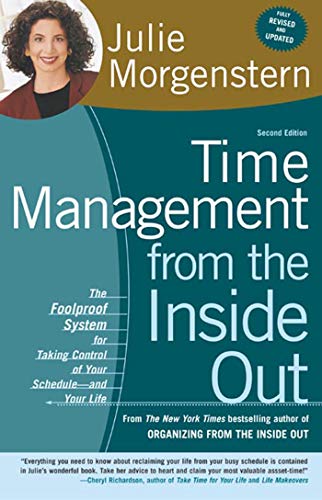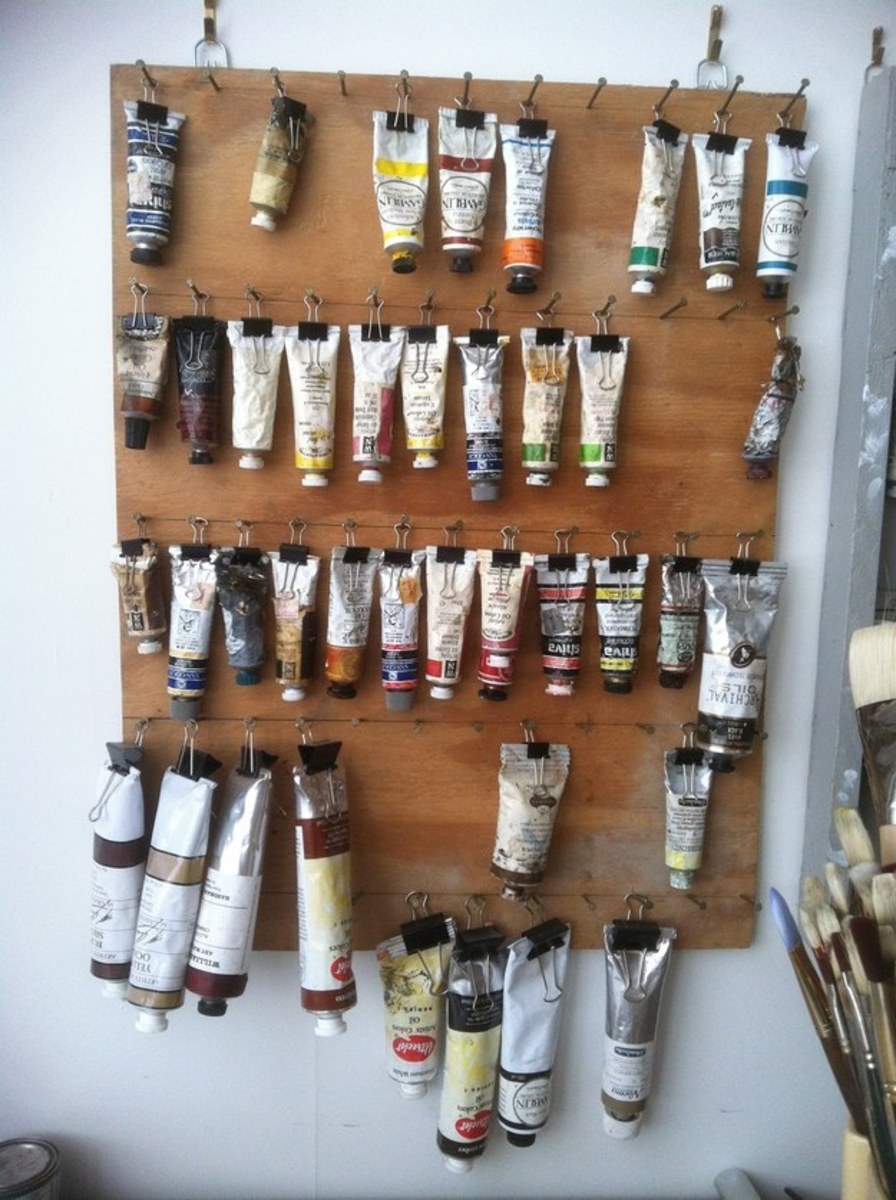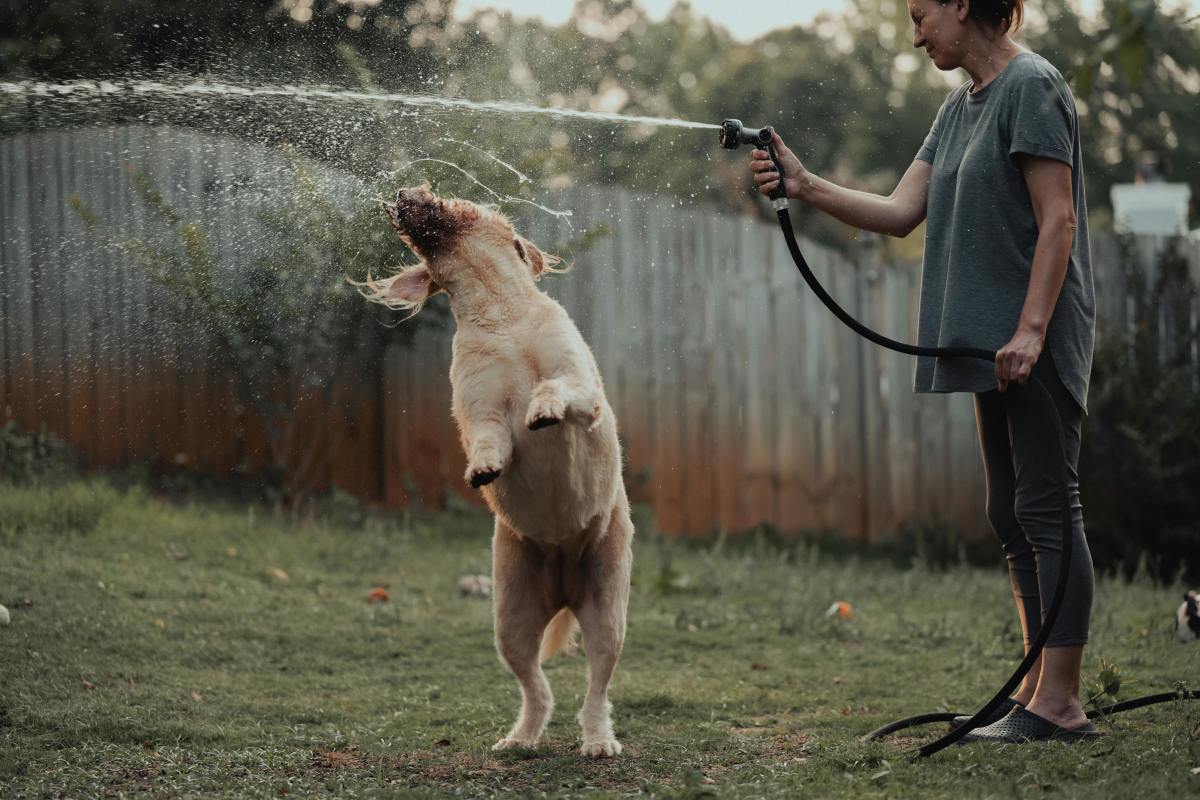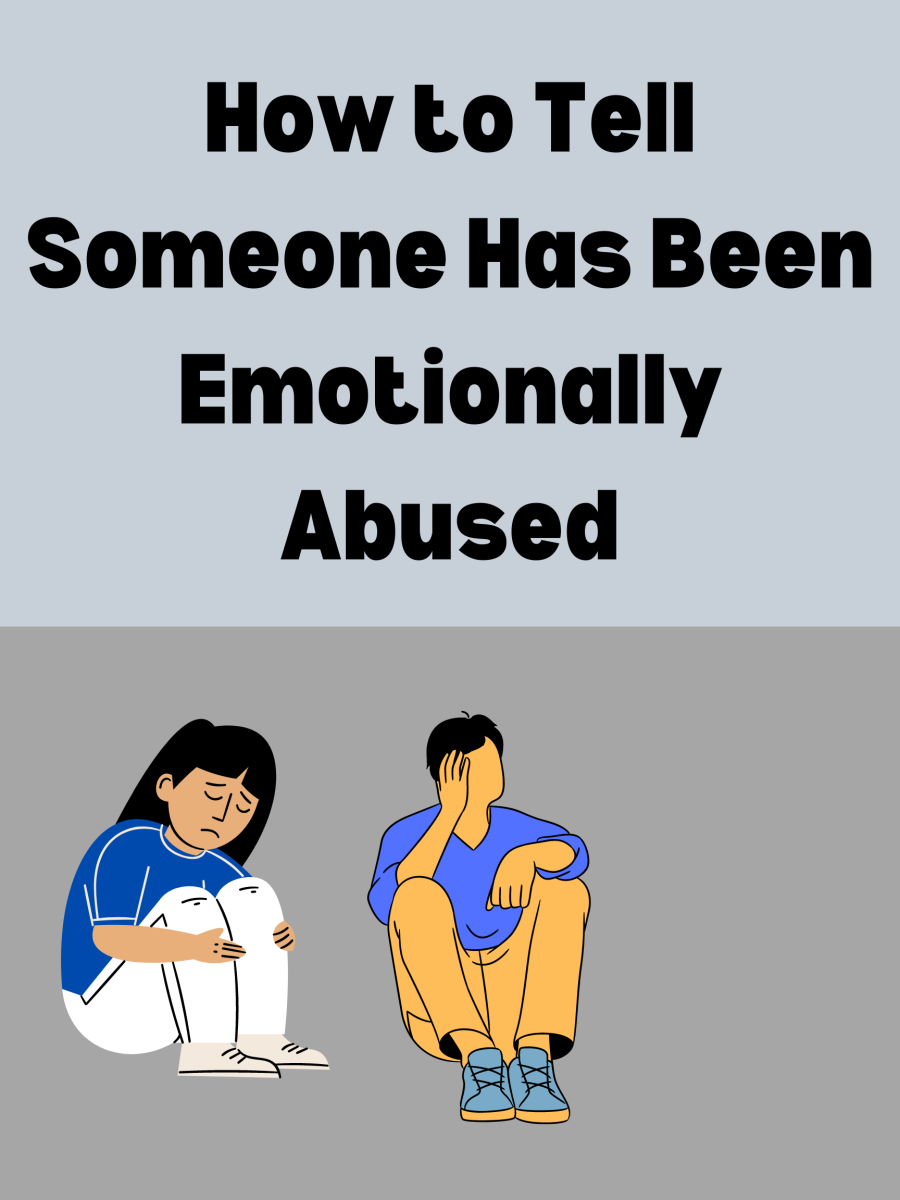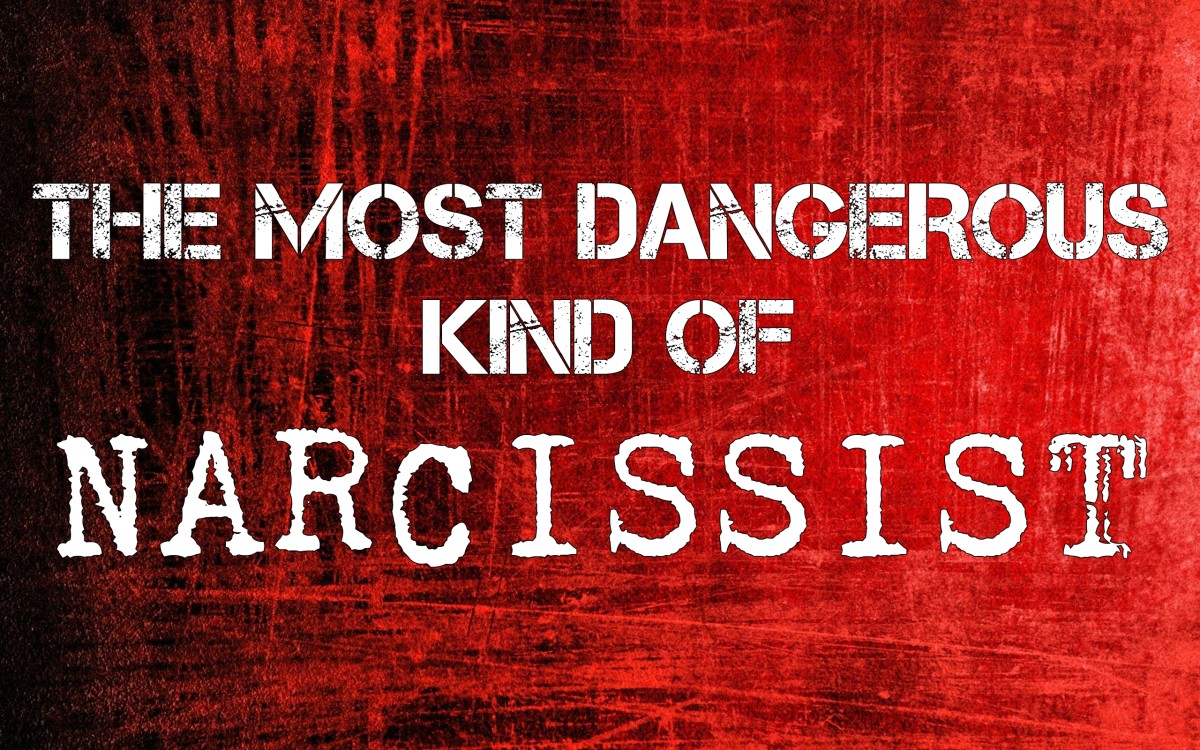Getting a Round Tuit: Creative Ways of Dealing with Procrastination and Motivating Yourself
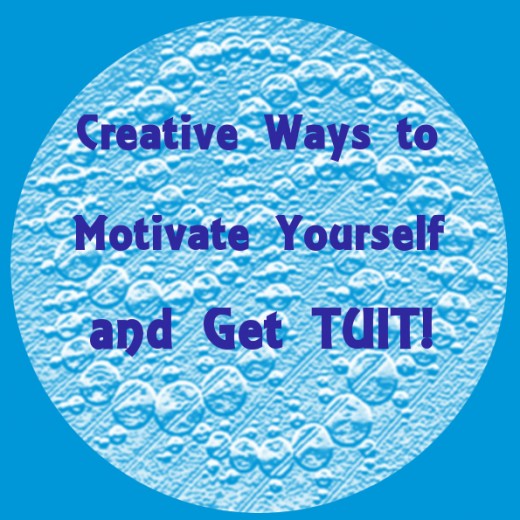
What is Procrastination? Is it a sign that things aren't right? A bad habit that needs overcoming? How can we motivate ourselves to get AROUND TO the things and projects that matter?
As a Life-Coach, psychic and spiritual advisor, these are some of the lessons that I teach my clients, to help them motivate themselves, release stress and move forward in a powerful way.
How I Found My Round Tuit (Around To It)
Here I am, having a simple (okay maybe not so simple) draft and lunch at my local pub.
I'll have to imagine the place, since it was so long ago. Perhaps it was the Claddagh Cottage where they make an astounding Chicken and Mushroom Pie and serve Guinness fresh on tap.
Did you know that Guinness actually has a program where they teach bartenders to pour a perfect stout? It's an artform!
I look down at the coaster under my glass, where the humidity from my beer is slowly condensing. It's round and the printing on it, rather than being the usual beer advertizement, just says "Tuit."
That's right, I finally got a round tuit. Of course you know I'm taking that puppy home and putting it on my wall as a reminder!
Am I procrastinating getting to my point?
Maybe a little. But it's a creative bit of procrastination. And hopefully can help you find ways to get motivated and get things done. In a way that allows you to feel good about yourself, release stress and be a more relaxed person.
How are you feeling today?
What's your mood and energy feel like?
What is Procrastination?
We all procrastinate here and there. In our crazy busy lives there are just so many things to do. Sometimes we just get overwhelmed with them all.
In Tarot it's the wand cards that talk about energy and our use or misuse of that. Any time I'm reading a client and see a bunch of wand cards come up, I can tell that it's a stressful busy time for them.
"Feeling like you're stressed out and going in circles?" I'll say.
Of course they laugh.
Procrastination Is a Sign
When we procrastinate it's usually telling us one of two things. Either we're faced with doing something we don't want to do, or we're trying to do so much that our bodies and minds are shutting down and forcing us to make a change.
Too much stress and too much doing-ness can actually make us physically ill. If you find yourself dealing with a winter or spring cold, or a summer flu, it might be a sign that you're bombarding yourself with work and need to slow down.
Allow yourself to breathe. Relax. Read a book. Meditate.
If on the other hand, you're so overwhelmed that you can't get up the energy to do anything, that's a sign that you are probably doing something you don't want to. What would you like to change in your life? What do you need to let go of?
Even If It's Wrong
A good friend of mine used to have a saying, "Do something. Even if it's wrong." In other words, get up off your duff and give yourself permission to motivate yourself.
Sometimes procrastination and stress come from trying for perfection. We're afraid to do something because we're afraid we won't do it right.
Be willing to make mistakes -- hey we all do, here and there, right? But doing something is better than getting bogged down.

Getting Organized to Get Tuit
Organization! *Groan*
But organizing yourself is a step towards getting stuff done. And in fact getting your tasks organized will relieve stress. And the small amount of time it takes to do this will make your jobs go faster in the end.
I used to have a fantastic book on success tactics. Sadly, I don't recall the title and thanks to my house fire I can't walk over to my bookshelf and pull it down. But I gleaned some important information from it, which I'll share with you. Over the years I've added my own thoughts to it as well.
This is a tip I share with my clients at least once a week, often more.
Make a to-do list. Then divide it up. Make that list all over again. But this time, ask yourself three important questions,"How long will it take?" and "How important is it?" Finally ask, "Is it something I want to do?
If it's fast and it's high priority: Get it done. Get it knocked off your list. Cross it off and feel that satisfaction that comes from having accomplished a task. Look at how much shorter your list is now,
If it's slow and it's high priority: Work on it next. You might want to try doing what we call in hypnosis, "Chunking it down." If several steps need to be done to accomplish your task take each of those steps and do them one at a time.
If it's fast but low priority: In between dealing with the slow important things, do one of these. Cross it off the list and feel great all over again.
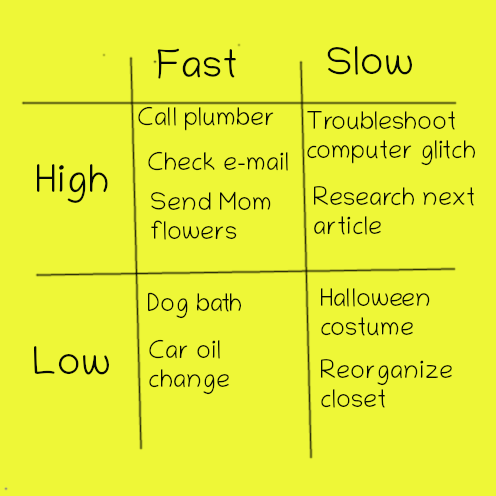
Slow, Low Priority Stuff
Here's where you have to do some soul searching. Is it something you really want to do?
If the answer is yes, then by all means, keep it on your list.
And if the answer is no, then do you really need it on that list? Would it be better to just cross it off the list right now?
Is it possible to pay someone to do it? Or is it possible to barter? If you have a job that has to be done and you don't want to do it, maybe there's someone you can trade off with. Maybe they even have a job that you're good at and they're not.
Team up with someone: For instance my girlfriend doesn't know how to sew. I love to sew, but I don't do it often enough. Since it doesn't effect my bottom line, it gets tossed into the procrastination bin. Helping her gives me an excuse to get some of my own done as well.
If it still has to get done, or you still want to do it, but it's not a big priority, then keep it on your list. Do it once the important jobs are finished. Again chunk down into partial tasks.
Remember to look over that list on a regular basis. In March, making that Halloween costume might be low priority. In October, it's probably higher.
Ten Minute Jobs
Beware the "ten minute job." It's one of the principles of Murphy's Law. If you expect a project to take only ten minutes, it'll probably take an hour. Or three.
This usually applies to projects you don't do often. and presume are going to be easy. Then something goes a little wrong. Maybe the screw heads on that door handle you're taking apart are stripped. Or you realize you got the wrong part at the store, and now your computer is spread all over your living room in little pieces.
I've found that it's always safer to overestimate how long something will take to do rather than underestimate. This way if something doesn't go as expected, I'm not rushing to finish it because I've set myself a deadline that's too short.
Remember to breathe and don't let it get you down.
Busy Getting Things Done
Change your self talk about your projects and your time.
Several years ago I was becoming more than a little over-committed. I was running two home businesses, teaching both publicly and privately, taking classes for my own education. and doing psychic readings as a part time job. I was on the board of my church and was head of several committees. Because there were so few volunteers I'd often volunteer if nobody else would. Then there was housework to do.
I get exhausted just remembering it!
And maybe somehow I could find a moment to work on my novel. Maybe?
Not really. Most of my writing during that time was ad copy for the business, articles for my business websites or answering emails about purchases.
One day I sat down with my mentor and asked what on Earth I should do. "I'm running around like a chicken with my head cut off!" I said.
"Every time I you say that you're making the problem worse. And you say that a lot."
So we discussed what I should say and my new mantra became, "I'm busy getting things done."
Know what happened?
I slowed down my church activity. At the next board meeting I brought two friends and asked them to club me if I raised my hand to volunteer for anything. I passed a few of my committees on to others. When my board term was over, I didn't run for the board again.
For a time, I slowed down the classes I was teaching to a public one per week and a private class every other. I set work hours when I would only take calls related to business.
And things started getting done.
Take a moment to consider the way you talk to yourself and others about your time, your tasks and your levels of stress and relaxation.
Are they positive metaphors or negative ones?
If they're negative, what can you say instead?
If you don't know the answer, pretend for a moment that you do. Now if you knew the answer, what would it be?
Creative visualization is fantastic resource for changing your self talk and empowering your life. It will teach you how to build healthy affirmations for many areas where you'd like to make create growth for yourself.
In hypnosis we learn that one positive thought can overcome 1000 negative ones.
I always kept two copies of this book - one to lend and one for myself.
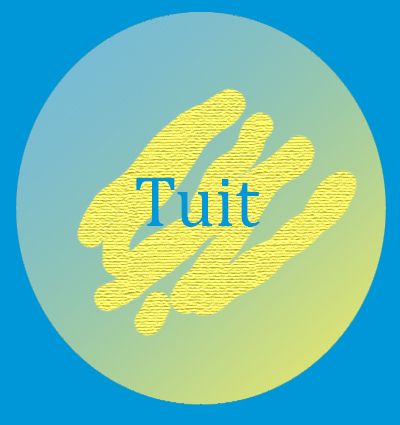
Paint Six Inches
Sometimes the best way out is through.
Here's a trick my hypnosis teacher taught me.
Lets say you want to paint the house. Make a commitment to yourself to paint just a six inch square of the walls every day. Sound do-able? I mean six inches -- you can do that, right? Sure you can!
But here's the catch. You're not allowed to just open the can of paint, dip a brush in and slap it on the wall. You have to get out the tarps, pull out all the brushes and rollers and a ladder and clean-up supplies.
Then you can paint your six inches.
Chances are, with all that prep you'll probably paint more than just six inches. You might paint a whole wall. Maybe even a whole room.
But if you even paint only that one six inch square, you've kept your commitment to yourself for the day. You've succeeded.
And your Unconscious Mind is going to be happy with you. Which is going to help you continue to be successful with your project.
Whether you're working on finishing a novel or starting an exercise program or building an engine, this can work. Just think of the smallest, most ridiculous amount you can do. Think of the steps you need to do before it to prep for it. Make that prep take about five to ten minutes. Then make the commitment to yourself.
Write one new sentence. Or one paragraph. Walk or jog five yards. Remove or replace four bolts, or clean one part of your engine.
And do it. It works. Nine out of ten hypnotists agree.
Could You Get Motivated With This?
Does the paint six inches idea feel like it might work for you?
Books to Help You Get a Round Tuit
Speaking of getting tuits, it's time for me to start rebuilding my bookshelf of useful books that will help me better serve myself and my clients. (A house fire wiped me out some time back.) This one looks excellent!
I know I had her Organizing From the Inside Out and found it very helpful.
Browsing through the "look-inside" on this, I think it definitely belongs on my shelf.
A very interesting and not-the-usual approach to time management. What I like about this is that it doesn't focus on to-do list, but takes a more metaphysical approach.
Some of the wisdom from this book is that since you can only do one thing at a time, focus on that one thing.
A 10 minute look at Time Warrior
Eat Lunch Outside
Too often we're working on a project and don't want to let it go, even to sit down and have a healthy lunch.
This is one that I need to remember to do myself. I'll be so excited about the article I'm writing that I'll gulp down a sandwich with one hand on the keyboard.
Not only can that lead to stress and indigestion, it can also result in expensive computer repairs. Trust me, I know.
Maybe you're one of those folks who actually does take lunch away from your desk. But where do you take it? In the breakroom talking with your buddies? (And maybe even talking about work?) On the phone handling appointments and challenges in other areas of your life? Texting? Reading facebook?
Prana is the natural ambient Air energy of the planet. It's clearing and relaxing. It stimulates our brain. In fact studies have shown that students who study or take tests outdoors actually get better scores!
So at least a few times a week, preferably more, take your lunch outdoors. Walk around in nature. Listen to the sounds of the Earth, feel the grass under your feet, even if it's just the weeds in the parking lot. Breathe.
Too cold where you live? That's fine. At least go outside for a moment or two and take in a bit of fresh air.
Take Time Out
The human brain can only learn so much at one time. Our brains need time to process. Some of this is done in our sleep, but any time we're learning new concepts, it helps to take time away. You'll retain more and grow new understandings as well.
Any time me and my collective group of teachers are conducting a class, we make sure to schedule a five to fifteen minute break every forty-five minutes. Forty-five minutes is about the most time the brain can receive information and process it without needing a break.
When I work at home, which is most of the time, I take frequent breaks to make myself a cup of tea, look out a window or pet the dog. That break allows me to stretch, to get away from the computer screen for a few minutes and to allow my brain a moment to process.
In fact, in the middle of writing this section of my article I stopped and made myself a cup of tea. Which gave me the inspiration to write about that.
Go Home On Time
Another tip from that excellent book that I don't recall the title of.
"But I can't," you may say. "I've got a deadline. I've got to finish this."
It seems that nowadays, bosses expect people to work overtime. Now occasional overtime isn't a bad thing. But if you're expected to do it the majority of nights a week, or take home work over the weekend all the time, then something's wrong.
First, your brain isn't getting the rest and relaxation that it needs to work more efficiently.
Second, it may be interfering with your relationships and mucking up your personal life.
Not to mention holding you back from writing that article or novel you want to write, or from taking a class that might benefit you either spiritually or professionally, or from doing something else that matters to you.
So what happens? You get resentful. You get frustrated. You get stressed.
And your work suffers from it.
Yup. People who work too much overtime are less productive, not more.
When you plan to go home on time, you're more efficient because you know exactly how much time you have to finish the tasks in front of you.
And when you return, after a good meal and a night of spending time with your loved ones, working or playing with your favorite project and getting restful sleep, you'll be more likely to work well the next day. Your mood will improve and your production will improve with it.
For us home-workers and self-employed folks that goes for us too. Set work hours for yourself and honor them.
If you must, start small. Start out by going home on time just one night a week.
Measure your productivity both before and after you start doing this, so that you can prove why the fact that you're going home on time doesn't mean you don't deserve that promotion.
Then start claiming one more on-time night, and then another.
Once your boss sees proof that you are more productive and efficient that way. He or she may even start doing so too!
Photo Credits
Photos adapted by Lionrhod:
Crop Circle from Handy Marks, Public Domain via Live Science
Lavender from Riley Huntley, Creative Commons by Share Alike via Wikimedia Commons
More Self Help Articles
Act Don't React: Learn to Control your Emotional Triggers and Buttons
How to reduce stress. get rid of anger, fear and other negative emotions by learning how your past experiences shape your actions. Then learn to take positive healthy response with the power of NLP and self-hypnosis so that you can be more effective in your communication and happier in your relationships.
© 2014 Lionrhod


